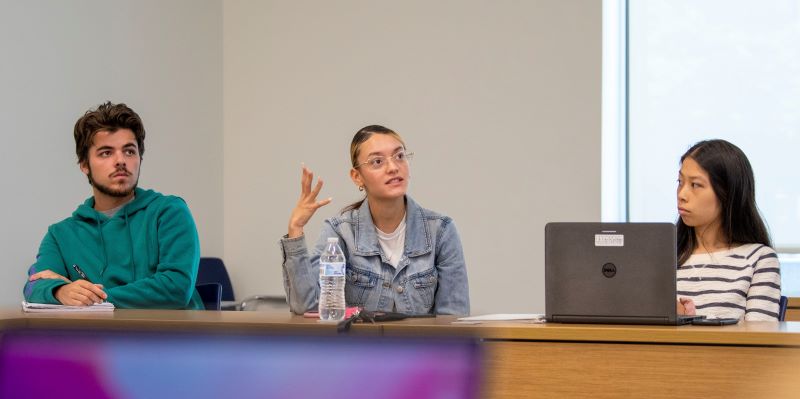-
Feb9
-
Feb9
-
Feb19In Conversation: Unwarranted Warrants? A Conversation about Search and SeizureStuart F. Smith Reading Room5:00 PM
Web cookies (also called HTTP cookies, browser cookies, or simply cookies) are small pieces of data that websites store on your device (computer, phone, etc.) through your web browser. They are used to remember information about you and your interactions with the site.
Session Management:
Keeping you logged in
Remembering items in a shopping cart
Saving language or theme preferences
Personalization:
Tailoring content or ads based on your previous activity
Tracking & Analytics:
Monitoring browsing behavior for analytics or marketing purposes
Session Cookies:
Temporary; deleted when you close your browser
Used for things like keeping you logged in during a single session
Persistent Cookies:
Stored on your device until they expire or are manually deleted
Used for remembering login credentials, settings, etc.
First-Party Cookies:
Set by the website you're visiting directly
Third-Party Cookies:
Set by other domains (usually advertisers) embedded in the website
Commonly used for tracking across multiple sites
Authentication cookies are a special type of web cookie used to identify and verify a user after they log in to a website or web application.
Once you log in to a site, the server creates an authentication cookie and sends it to your browser. This cookie:
Proves to the website that you're logged in
Prevents you from having to log in again on every page you visit
Can persist across sessions if you select "Remember me"
Typically, it contains:
A unique session ID (not your actual password)
Optional metadata (e.g., expiration time, security flags)
Analytics cookies are cookies used to collect data about how visitors interact with a website. Their primary purpose is to help website owners understand and improve user experience by analyzing things like:
How users navigate the site
Which pages are most/least visited
How long users stay on each page
What device, browser, or location the user is from
Some examples of data analytics cookies may collect:
Page views and time spent on pages
Click paths (how users move from page to page)
Bounce rate (users who leave without interacting)
User demographics (location, language, device)
Referring websites (how users arrived at the site)
Here’s how you can disable cookies in common browsers:
Open Chrome and click the three vertical dots in the top-right corner.
Go to Settings > Privacy and security > Cookies and other site data.
Choose your preferred option:
Block all cookies (not recommended, can break most websites).
Block third-party cookies (can block ads and tracking cookies).
Open Firefox and click the three horizontal lines in the top-right corner.
Go to Settings > Privacy & Security.
Under the Enhanced Tracking Protection section, choose Strict to block most cookies or Custom to manually choose which cookies to block.
Open Safari and click Safari in the top-left corner of the screen.
Go to Preferences > Privacy.
Check Block all cookies to stop all cookies, or select options to block third-party cookies.
Open Edge and click the three horizontal dots in the top-right corner.
Go to Settings > Privacy, search, and services > Cookies and site permissions.
Select your cookie settings from there, including blocking all cookies or blocking third-party cookies.
For Safari on iOS: Go to Settings > Safari > Privacy & Security > Block All Cookies.
For Chrome on Android: Open the app, tap the three dots, go to Settings > Privacy and security > Cookies.
Disabling cookies can make your online experience more difficult. Some websites may not load properly, or you may be logged out frequently. Also, certain features may not work as expected.






![]()
Top 9%
Ranked Among Graduate Social Work Programs Nationwide
$23.5M
Research and Sponsored Programs Expenditures FY25
$73.5M Research and Sponsored Programs Portfolio
$1.5M
Student Scholarship Funding
250+
Field Education Internship Sites
8,800+
Alumni Worldwide
![]()

Our Bachelor of Social Work degree program prepares students to advance human rights and social justice, and to serve individuals, families, and communities in need.

Our Master of Social Work program prepares students for clinical social work and allows them to pursue their passion for social justice on campus full time or part time, online part time or through Advanced Standing.

Our doctoral students are welcomed into a supportive community where they are mentored, and prepared to teach and conduct research to address critical social problems.

Our CE program offers social workers and human service professionals the coursework and credits they need to serve clients, agencies, and communities.

Our Non-Degree program allows students to explore the field of social work and potentially apply credits toward our Master of Social Work degree program.
![]()



![]()
Innovations Institute, at UConn’s School of Social Work (SSW), works in partnership with government agencies, health care providers, youth and their families, and community-based organizations nationwide to improve outcomes for children, youth, young adults, and their families. A University institute of the SSW, Innovations extends the School’s commitment to social, racial, and economic justice and the improvement of human well-being nationwide.
The Nancy A. Humphreys Institute for Political Social Work works to increase the political participation and power of social workers and the communities they serve. The Institute leads the national "Voting is Social Work" Campaign, and trains social workers and students to lead in politics through its Campaign School for Social Workers.
![]()
The @uconnsocialwork invites our community to join us in commemorating Black History Month.
This year’s theme, “A Century of Black History Commemorations,” honors the people, movements, and milestones that have shaped—and continue to shape—our nation.
Throughout February, we reflect on Black leadership, resilience, and contributions past and present.
Join us as we learn, remember, and celebrate together. 🖤✊🏾
#BlackHistoryMonth
...
Students, faculty, and staff returned to the UConn Hartford Campus and the @uconnsocialwork today after 17 inches of snow accumulated over the past two days. Freezing temperatures are expected to continue over the next week. Stay warm Huskies! 🐾❄ ...
Welcome to the @@uconnsocialwork Office of Student and Academic Services (OSAS)! Our mission is to support our BSW, MSW, Ph.D. and Non-Degree students during your academic program. The OSAS staff—Nicki, Carmen, Carlton, and Natalie—are available to assist with academic advising, course registration, and graduation.
Learn more about OSAS: https://socialwork.uconn.edu/current-students/
...
In a newly released Action Research Yes/And podcast, @uconnsocialwork Associate Professor and mindfulness teacher Caitlin Elsaesser speaks about the role of academic youth participatory action research (YPAR) facilitator vulnerability as a practice to support authentic adult-youth collaboration.
Listen in! https://soundcloud.com/hilary-bradbury/skillful-vulnerability-practice
...
🎉 Two @uconnsocialwork faculty and two doctoral students are co-authors of a newly published article in the June 2026 issue of "Social Science & Medicine—Qualitative Research in Health" examining the psychosocial repercussions of long-COVID. 😷
In “Identifying interventions and coping strategies to address the psychosocial repercussions of long-COVID: A qualitative interpretive meta-synthesis,” Assistant Professors Kelsi Carolan and Ripal Parekh, along with Ph.D. students Doreek Charles and Laura Moynihan, used a qualitative research methodology to examine how individuals with long-COVID cope, what supports they value, and the barriers they face.
🔍 Their study examines the psychosocial impacts of long-COVID, highlighting:
✔️ The need for validation and empathy from healthcare providers
✔️ The role of mental health care and social support
✔️ Barriers like medical gaslighting and limited access to care
Persistent barriers including medical gaslighting, limited treatment access, and systemic challenges within healthcare and disability systems
This study addresses a critical gap in long-COVID research and has important implications for psychosocial interventions, provider education, and health and disability policy.
👏 Congratulations to the authors on this important contribution to public health and social work research.
Read the article: https://www.sciencedirect.com/science/article/pii/S266732152600003X
#uconnssw #socialwork
...
Are you thinking about applying for the on-campus MSW program at @uconnsocialwork? Applications are due by Feb. 15! ...